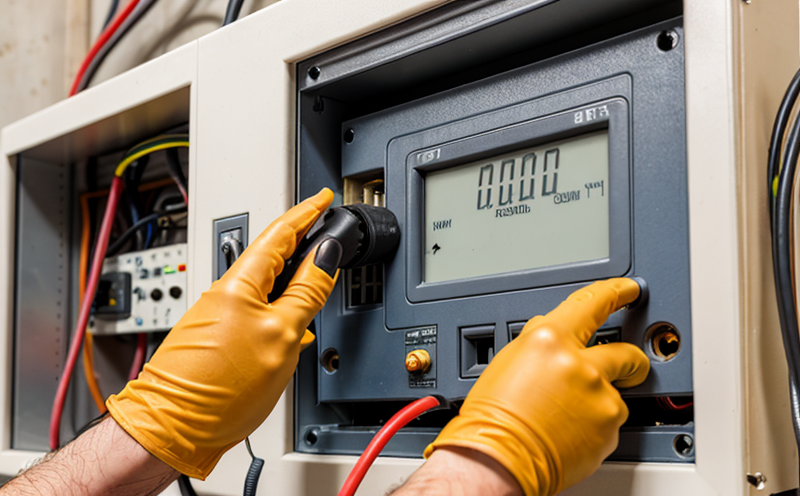UL 2580 Electrical and Functional Testing of EV Battery Systems
The UL 2580 standard is a critical benchmark for the electrical safety, durability, and performance testing of electric vehicle (EV) battery systems. This service ensures that manufacturers meet stringent industry standards to protect consumers from potential hazards while providing reliable energy storage solutions.
UL 2580 addresses several key aspects, including thermal management, electrical integrity, mechanical robustness, and functional performance under various operating conditions. The standard is designed to be comprehensive, covering a wide range of scenarios that an EV battery might encounter during its lifecycle. By adhering to this standard, manufacturers can enhance product safety, reliability, and consumer trust.
Our laboratory offers UL 2580 testing services tailored for the automotive industry, focusing on the rigorous evaluation required by this standard. Our team uses cutting-edge equipment and follows internationally recognized protocols to ensure accurate and reliable test results. This service supports not only compliance but also innovation by providing insights into how different factors can impact battery performance.
The UL 2580 testing process involves a series of specific procedures aimed at assessing critical parameters such as overcurrent protection, thermal runaway prevention, and energy transfer efficiency. Each step is designed to mimic real-world conditions experienced by EV batteries during charging, discharging, and normal operation. This comprehensive approach ensures that the tested units are robust enough to withstand both typical use and extreme circumstances.
By partnering with our laboratory for UL 2580 testing, clients receive detailed reports that provide a thorough analysis of their battery systems' performance against industry standards. These reports can be invaluable tools in product development, quality assurance, and regulatory compliance efforts. Additionally, they serve as strong selling points when marketing products to potential customers who prioritize safety and reliability.
Our experienced technical staff works closely with clients throughout the testing process, offering guidance on specimen preparation, equipment selection, and interpretation of results. We understand that each project has unique requirements, which is why we customize our services to meet those needs while maintaining high-quality standards.
Customer Impact and Satisfaction
Adhering to UL 2580 testing ensures that our customers receive products that are not only safe but also highly reliable, which ultimately enhances customer satisfaction. By investing in this rigorous form of quality assurance, manufacturers can build a reputation for excellence and trustworthiness within the marketplace.
The results from these tests provide valuable feedback on areas where improvements may be needed, allowing companies to refine their designs and processes continuously. This iterative process helps ensure continuous improvement over time, leading to better products overall.
Moreover, successful completion of UL 2580 testing can significantly reduce the risk associated with product failure or recall, thereby protecting both brand reputation and financial investments made in R&D efforts. For procurement teams looking for reliable suppliers, compliance with this standard serves as a strong indicator of reliability and quality control practices.
Our laboratory's focus on delivering accurate test results contributes directly to customer satisfaction by ensuring that all aspects of the EV battery system meet or exceed established benchmarks. This commitment to excellence sets us apart in providing comprehensive support for those seeking to comply with UL 2580 standards.
Competitive Advantage and Market Impact
Compliance with UL 2580 testing provides significant competitive advantages in today's highly regulated automotive industry. It demonstrates a commitment to safety, quality, and innovation that can set companies apart from competitors who may not adhere to such stringent standards.
For manufacturers aiming to enter new markets or expand their product offerings into regions with strict regulations around EV battery technology, UL 2580 certification offers peace of mind. It reassures potential clients about the safety and reliability of your products, making it easier for you to secure contracts and gain market share.
Additionally, this standard fosters collaboration between different stakeholders involved in developing advanced battery technologies—research institutions, government bodies, and private enterprises alike benefit from shared knowledge gained through adherence to such high standards. Such collaborations accelerate technological advancements while ensuring compatibility across various platforms and applications.
The demand for electric vehicles continues to grow worldwide as governments around the globe implement policies encouraging sustainable transportation solutions. By staying ahead of regulatory trends and implementing best practices like those outlined in UL 2580, companies position themselves well to meet future demands while maintaining leadership positions within their respective industries.
Use Cases and Application Examples
| Use Case | Description |
|---|---|
| Battery Safety | Testing for thermal runaway prevention, overcurrent protection, and other safety features. |
| Energy Transfer Efficiency | Assessment of how well the battery can transfer stored energy during discharge cycles. |
| Thermal Management | Evaluation of cooling systems' performance to ensure they operate efficiently under various conditions. |
| Structural Integrity | Checking the mechanical stability and durability of the battery pack through simulated impact tests. |
| Environmental Stressors | Investigation into how exposure to harsh environmental factors affects long-term performance. |
| Charging Compatibility | Determining whether the EV can safely connect with various charging infrastructures, including fast chargers and home outlets. |
| Fault Detection | Identifying potential faults early in the development process to prevent costly errors later on. |
| Performance Under Extreme Conditions | Evaluating how well the battery performs when subjected to extreme temperatures, humidity levels, and other challenging scenarios. |
The above table illustrates some of the key use cases for UL 2580 testing in relation to EV battery systems. Each scenario represents a critical aspect that must be addressed during development and manufacturing processes to ensure safe and efficient operation.
In practice, these tests are conducted using specialized equipment designed specifically for assessing different facets of EV batteries' performance. The results generated from these experiments help guide further refinements in design and construction methods, ultimately leading to more reliable and safer products.





